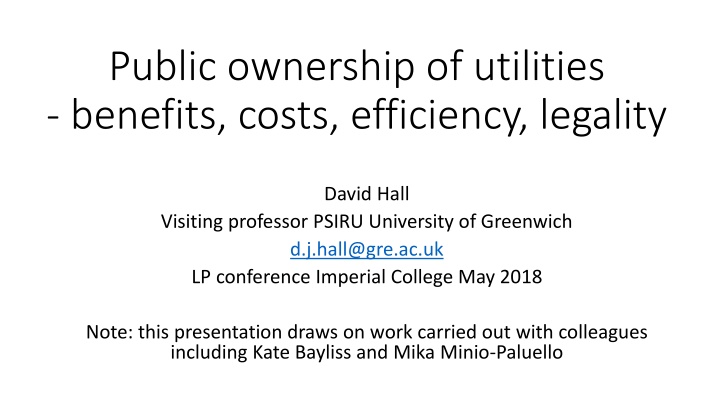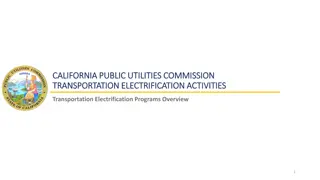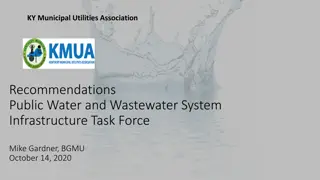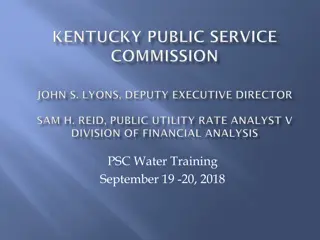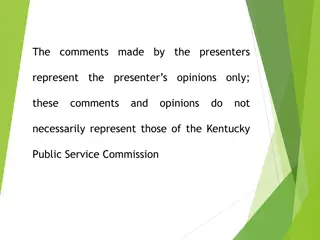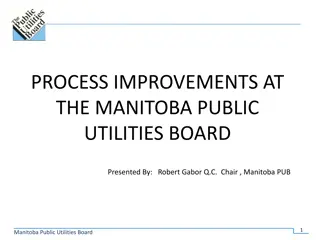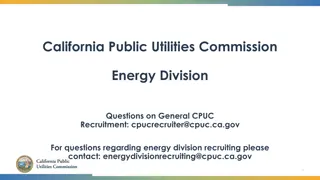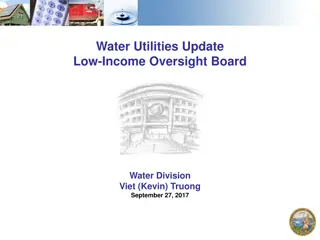Benefits and Challenges of Public Ownership of Utilities
Public ownership of utilities offers economic gains, democratic control, and addresses public interest objectives such as renewable energy and affordability. This model presents opportunities for cost savings, local economies, and transparent planning. However, challenges like debt accumulation and profit distribution impact sectors like water and energy. The discussion also emphasizes the potential of public ownership in improving energy grids and promoting renewable energy sources.
Download Presentation

Please find below an Image/Link to download the presentation.
The content on the website is provided AS IS for your information and personal use only. It may not be sold, licensed, or shared on other websites without obtaining consent from the author.If you encounter any issues during the download, it is possible that the publisher has removed the file from their server.
You are allowed to download the files provided on this website for personal or commercial use, subject to the condition that they are used lawfully. All files are the property of their respective owners.
The content on the website is provided AS IS for your information and personal use only. It may not be sold, licensed, or shared on other websites without obtaining consent from the author.
E N D
Presentation Transcript
Public ownership of utilities - benefits, costs, efficiency, legality David Hall Visiting professor PSIRU University of Greenwich d.j.hall@gre.ac.uk LP conference Imperial College May 2018 Note: this presentation draws on work carried out with colleagues including Kate Bayliss and Mika Minio-Paluello
Why public ownership of utilities Why public ownership of utilities Economic gains (cost of capital, transaction costs, local economies) Democratic gains: control and planning and localisation and transparency Public interest objectives: renewable energy, affordability and it s popular, efficient, affordable, and legal
Debt and equity in the water sector 1990-2015 Source: NAO 2015 Bayliss & Hall, Southampton, March 2018
Total profits 2007 Total profits 2007- -2016 and uses 2016 and uses Post tax profit ( m) Retained earnings ( m) Pre-tax profit ( m)Tax ( m) Dividends ( m) Interest payments Company Thames Water 3,361 -195 3,165 -2,531 -3,006 6340 Total for all 9 English water companies) 20,707 -1,666 18,862 -18,129 -14,650 733
Energy: problems in all functions Transmission and distribution grids, private monopolies, excessive charges CAB estimates consumers are owed 7.5bn. by grids alone for over-charging Half of profits taken as dividends Need for grids to be more flexible/smart in functions Big 6 supply companies repeatedly criticised for charges Some small and/or municipal supply companies start up eg Robin Hood Energy Renewable generation Large public sector RE normal in Europe eg Dong, Vattenfall, Munich Big potential for public regional offshore RE in UK
Water and energy: public ownership possible role Public ownership of water and sewerage companies (and water only companies) Public ownership of electricity and gas transmission and distribution grids Natural monopolies, savings from reduced cost of capital, 2bn. + Public sector supply companies in all regions More reliably affordable energy Co-exists with other supply companies Regional renewable energy inc. via LECs Local solar and wind, but also public investment in offshore wind etc Local energy communities (LECs) enable villages/towns/cities to run renewable energy, grids, and/or supply services Also part of EU thinking
Economic benefits Reduced costs of capital: saving over 2billion per year in both water and energy by elimination of dividends and reduction of interest rates Lower transaction costs through direct control Eliminate corporate functions etc: note savings made after ending of PFIs in London, Manchester Regulation: can simplify/reduce/democratise cf OFGEM spends 63m./emp 883 Local economy: about 400m per region annual boost to economy, through consumer spending, and/or employment, procurement, just from water/grids public ownership potential for downstream investment and procurement by regions
Democratic control of public services Democratic control of public services Large public sector companies are common in Europe: regional or city level Stockholms Stadshus AB: owned by the City council, 16 companies, including housing, social care, water, waste management, economic development, stadiums, cable services, arts, district heating and energy, port: employs 2,792. Financially OK 2016: income = 1.33 billion, pre-tax profits 171m., paid tax 51m, dividend 44m. Supervisory board: 9 from councillors (4M, 5F), reflecting party balance, + 4 trade union reps Eau de Paris: 10 councillors, 2 professional experts, 2 staff reps, 1 from environment assn, 1 consumer assn, 1 from water observatory Intermunicipal companies common Netherlands, owned by districts/provinces: board 4 council reps, 2 worker reps Milan Gruppo CAP, owned by 196 municipalities, realtime information on syste, including reason and progress on all works in city, including contractor names (WebGIS) UK too: Transport for London (TFL) board open and online (but no worker reps)
Democratic control and professional management Creation of new regional authorities for water, energy (etc) Consist of councils in region, regional board members from councils Can include also reps from consumers, workers, environmental groups etc Create information obligations, public meetings/online documents (as TFL) Regional auths as supervisory boards of new public sector companies So eg water, energy distribution grid, renewable generation, supply Information and planning key roles for regional, national, local bodies
Efficiency: no comparative advantage for private sector firms Efficiency: no comparative advantage for private sector firms Meta-reviews and major studies across countries and sectors find no consistent difference (including sectoral studies) Most recent review of studies across sectors concludes that: research does not support the conclusion that privately owned firms are more efficient than otherwise comparable state- owned firms. (M hlenkamp 2015) Knayezeva et al (2013) control for selection bias in comparative study of 2400 firms, and showed, with a high level of statistical significance, that privatised companies did worse than those that remained public, and continued to do so for a period of 10 years: the privatization group underperforms the group of sectors remaining public . UK privatisations in general: little evidence that privatisation has caused a significant improvement in performance (Martin and Parker 1997, Florio 2004) Similar for meta-review of studies of outsourcing versus direct provision: it is not possible to conclude unambiguously that there is any systematic difference in terms of the economic effects of contracting out technical areas and social services (Petersen et al 2012)
Affordable: compensation costs not prohibitive Affordable: compensation costs not prohibitive UK law: parliament decides, not city rules, can pay less than market value e.g. for economic justice (Moodys, Linklaters) Claims by SMF et al that compensation will cost 90billion: use virtual figure of RAV, which includes debt: economically illiterate (Dieter Helm 2018) Hall2016 est compensation for elec/gas grids as 24bn, cf. annual savings 2bn+ Bayliss/Hall 2017 est compensation for water as circa 20bn, cf. annual savings 2bn+ increases UK public debt from 100% of GDP to 105% : no cause for alarm (FT) Investors would probably not flee UK, cf. German expropriation of nuclear reactors in 2011 without compensation, no capital flight (city analyst) Jonathan Ford, City Editor of FT: The whole aim of the exercise would presumably be to stop private companies from making excessive returns from the public. Why then would the government start by paying a market premium based on those same excessive returns? (FT 18 Feb 2018 John McDonnell is right: Britain can easily nationalise water )
Proposals comply with EU law General EU neutrality on public ownership TFEU art. 345: The Treaties shall in no way prejudice the rules in Member States governing the system of property ownership. Public ownership plans within sectoral legislation in energy EU energy rules do not forbid public ownership No monopoly of supply Grid and supply/generation functions separated as per current law Lots of public ownership already in EU, trend to remunicipalisation
Legal: Netherlands even makes private ownership of water and energy grids illegal Legal: Netherlands even makes private ownership of water and energy grids illegal Water: Waterleidingwet 2004 (articles 3i,3j,1f.): It is forbidden to produce or deliver drinking water to consumers . except for a water company over which control is exclusively exercised by ..public authorities ( publiekrechtelijke rechtspersoon ) Electricity and gas grids: Electricity Act 1998, Gas Act 2008: private ownership of transmission/distribution systems prohibited Legality confirmed by CJEU Essent 2013 para 39,69: Article 345 TFEU must be interpreted as covering rules entailing the prohibition of privatisation the objectives which underlie the choice of the legislature in relation to the adopted rules governing the system of property ownership may be taken into consideration as overriding reasons in the public interest to justify the restriction on the free movement of capital. Netherlands also uses inhouse exemptions from procurement laws: 2012Transport Act allows big cities to run routes inhouse without tendering http://www.pprc.eu/wp- content/uploads/Public-Procurement-Law-and-In-House-Delivery-of-Public-Services-Improving-a- Paradox.pdf 2010 Social Support Act allows inhouse household support service, reversing previous requirement to tender. EU complains but courts say OK. Intermunicipal IT company Wigo4it : in-house, no tendering needed
References Bringing water into public ownership: costs and benefits K. Bayliss and D. Hall May 2017 Hall and Nguyen (forthcoming 2018): Economic benefits of public services Real World Economics Review
